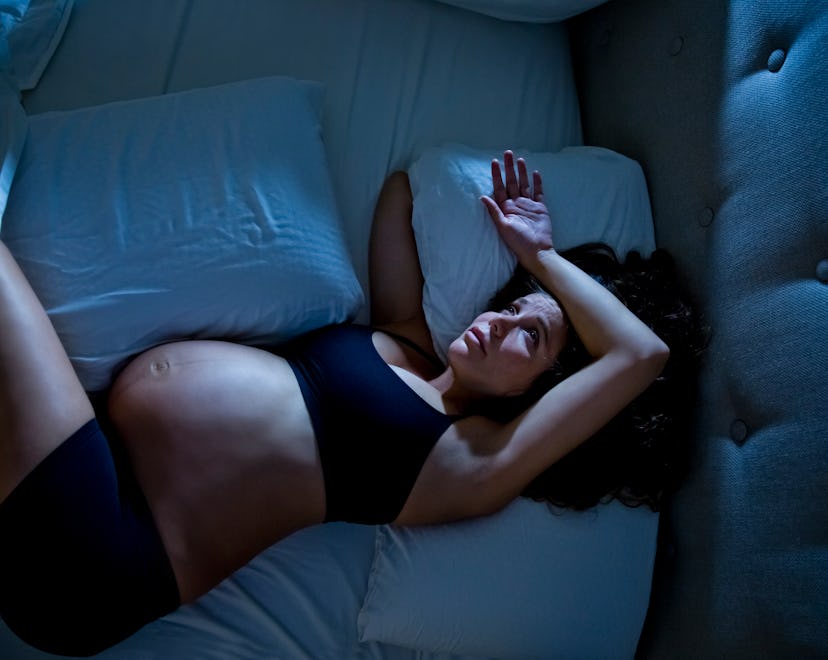Sleep

Does Pregnancy Cause Insomnia? Here’s What Experts Have To Say
If you’re up all night, blame your blooming belly.
From the tips of your (probably) swollen toes to the (hopefully) luscious locks on top of your head, pregnancy can affect your entire body and all of its processes. The ability to sleep soundly is no exception. But does pregnancy cause insomnia? If you feel like you might never get a good night’s rest again, this is one question that can spawn a million midnight scroll sessions.
“Pregnancy’s shifting hormones and physical changes are a recipe for bad sleep,” doula and birthing expert Sara Lyon tells Romper. Read on to understand how insomnia can happen during pregnancy and what you can do to help get some much-needed shut eye.
How Common Is Insomnia During Pregnancy?
The American College of Obstetricians and Gynecologists (ACOG) defines insomnia as “being unable to get enough sleep to feel refreshed, for at least three nights a week for one month or longer.” The organization noted that insomnia happens when a person is trying to sleep and has enough time to sleep but cannot.
“Insomnia is extremely common during pregnancy, affecting more than half of pregnant women, particularly in the third trimester as your body undergoes physiological changes and your belly is rapidly growing,” Paul Osterdahl, D.O., an obstetrician with Inspira Medical Group, tells Romper.
Though there are no exact figures available for exactly how many expectant parents experience insomnia, Lyon estimates that upward of 75% of women may experience insomnia at some point during pregnancy.
Why Does Pregnancy Cause Insomnia?
Though the urge to rifle through the fridge for a midnight snack can be overwhelmingly strong during pregnancy, cravings certainly aren’t the only thing that can keep you up at night.
“Most commonly, sleep is negatively impacted by general physical discomfort: your belly is growing, you’re experiencing back pain, pelvic pain, nausea, heartburn, and frequent urination through the night,” Osterdahl says. “In addition to the physiological changes, stress and anxiety — as well as depression — can certainly make you lose sleep as you are anticipating and preparing for the arrival of your new baby.”
Lyon tells Romper that nausea, night sweats, and restless leg syndrome can also keep expecting moms awake more than usual, noting that different symptoms can cause insomnia at different points in pregnancy. “These symptoms can manifest throughout pregnancy, changing from day to day,” she explains.
Tips For Managing Insomnia During Pregnancy
Tried and true techniques for more restful sleep can be helpful when you’re pregnant and experiencing insomnia. Osterdahl recommends first trying a relaxing bedtime routine that includes avoiding blue light from screens, taking a warm bath, drinking caffeine-free tea, reading a book, or listening to calm music. He also suggests limiting caffeine intake, engaging in light exercise, and avoiding long daytime naps.
“If you simply can’t get comfortable, try changing sleep positions,” Osterdahl says. “For optimal comfort and blood circulation, we recommend sleeping on your side with your knees bent. If you’re experiencing back pain, you can place a pillow between your legs to alleviate some pressure. There are multiple pregnancy pillows designed to help in achieving a comfortable sleeping position.”
Depending on what symptoms are causing your insomnia, you may need to try a few different strategies to find a solution that works for you. “Some causal factors can be treated independently, and others are an unavoidable part of pregnancy reality, like more frequent trips to the bathroom as the bladder is squeezed by a growing fetus,” Lyon explains. For example, she notes that deep tissue massage and hydration may help restless leg syndrome while certain supplements or prescriptions from your provider can alleviate nausea or night sweats.
“If conservative measures are not working, speak to your physician,” Osterdahl tells Romper. “They may be able to recommend additional treatments such as professional cognitive behavior therapy or medications if needed. They may also diagnose underlying medical conditions that are contributing to your insomnia, such as restless leg syndrome.”
Experts:
Sara Lyon, birthing expert, doula, author of The Birth Deck and You’ve Got This: Your Guide to Getting Comfortable with Labor
Paul Osterdahl, D.O., OBGYN at Inspira Medical Group Obstetrics and Gynecology Mullica Hill